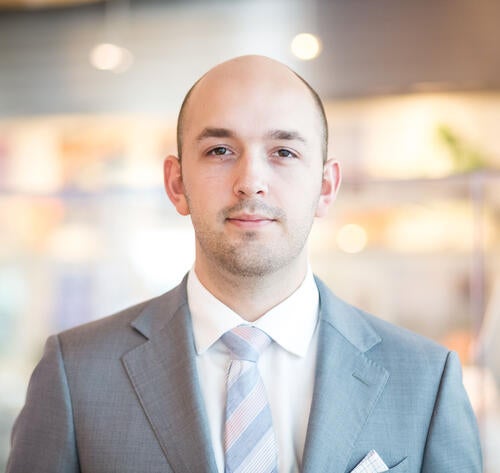
Helping police react to mental health crises
Intelligence-driven tech supports both individuals in crisis and the officers assisting them

Intelligence-driven tech supports both individuals in crisis and the officers assisting them
By Shelley White University Relations
Daniel Pearson Hirdes
Alumnus, Faculty of Arts (BA ’15)
> CEO and co-founder, HealthIM
> Velocity
Each day across Canada, police officers respond to emergency calls in which mental health is a key concern. This can result in complex, potentially volatile situations where an officer’s ability to respond effectively is crucial.
According to 2012 Statistics Canada data, approximately one in five contacts with police across the country involved a person with a substance abuse or mental health disorder.
To help address this challenge, University of Waterloo psychology alumnus Daniel Pearson Hirdes and computer science alumnus Daniel MacKenzie founded HealthIM to equip officers with better understanding of mental illness and how to respond.
The intelligent platform allows officers to digitally record their encounters with the public and send information to their partners in health care organizations. The evidence-based mental health assessment also uses an algorithm to predict an individual’s risk of harm. The goal is to ensure that with the right information, officers will take the most empathetic steps to support people with mental health concerns.
In the past, officers would write down their observations in a notepad, which led to “a lack of standardization between how different officers might respond to these calls,” Pearson Hirdes says.
“Providing accurate information can go a long way to providing better care for the individuals involved, so everyone understands the situation in the same terms.”
Pearson Hirdes and MacKenzie founded HealthIM in 2012 while they were both students at Waterloo. After winning $25,000 at Velocity’s pitch competition in 2015, they moved into Waterloo’s Velocity incubator, Canada’s most productive startup incubator, until they outgrew the space in 2017.
Today, the platform is being used in 21 police services and RCMP detachments in Ontario, Manitoba and Saskatchewan. In the upcoming year, more are coming online in British Columbia and North Carolina.
Among them is the police service in Brantford, Ontario, which receives between 2,500 and 3,000 emergency calls a year — or seven to 10 calls a day — in which mental health is a contributing factor, according to Geoff Nelson, chief of police.
Although his officers were already receiving a great deal of mental health-related training from specialists in their community, Nelson says the HealthIM software has supplemented this knowledge in unique ways.
“As the officers began using the platform, they became more comfortable with the terminology,” he says. “Just by virtue of using the application, I think their knowledge and understanding of mental health increased.”
Officers can use HealthIM from their workstations or mobile devices, and they are prompted to answer a series of structured questions about the individual in crisis. The platform provides detailed explanations for clinical language used in the questions, to ensure accurate understanding. Pearson Hirdes says this is especially important given that community mental health agencies, doctors, nursing staff, hospitals and police officers in the field all use different terminology to describe behaviours they observe during mental health crisis calls.
Once questions are answered, the tool employs algorithms to calculate the likelihood that an individual will harm themselves, harm others or fail to care for themselves. Officers can use these results to inform their on-scene decision-making about the best next step for that person, be it connecting them to support services or taking them to a hospital for psychiatric support.

Read more
Trexo Robotics has engineered a wearable solution for kids living with mobility challenges

Read more
Meet the Waterloo alumnus named on the 2019 Forbes 30 Under 30 Asia list

Read more
After early success with pro sports teams in the U.S., Penta Medical’s CEO returns to Canada to grow her HealthTech company
The University of Waterloo acknowledges that much of our work takes place on the traditional territory of the Neutral, Anishinaabeg, and Haudenosaunee peoples. Our main campus is situated on the Haldimand Tract, the land granted to the Six Nations that includes six miles on each side of the Grand River. Our active work toward reconciliation takes place across our campuses through research, learning, teaching, and community building, and is co-ordinated within the Office of Indigenous Relations.